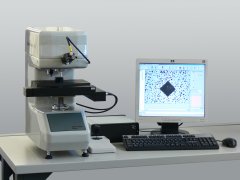Hardness testing is highly complex, with a number of different test methods used for a wide range of materials. Zwick offers two innovative hardness testing instruments which combine universal application and easy operation.
 ZHV1 micro Vickers hardness tester is used for automatic series and hardness profile.
ZHV1 micro Vickers hardness tester is used for automatic series and hardness profile.
ZHV1 fully automatic microVickers hardness testing instrument
The ZHV1 micro Vickers hardness tester from Zwick is used for automatic series and hardness profile tests, where it's fully automatic operation saves time and minimizes operator error.
The image analysis integrated into the testXpert testing software automatically measures the hardness indentations. Control, evaluation and, where required, transfer for further processing by quality assurance systems are also handled by testXpert.
One outstanding feature of this advanced hardness tester is enhanced indentation and sharpness identification, with different surfaces and at any magnification. Automatic indentation measurement has also been further improved, even with difficult surfaces, while hardness profile tests with multiple sequences are now also possible.
The ZHV1 micro Vickers hardness tester covers a wide range of applications - determination of case-hardened depth CHD to DIN EN ISO 2639, determination of the conventional depth of hardening after surface heating to DIN EN 10328 and determination of the effective depth of hardening after nitriding to DIN 50190-3. Its advanced features make it a highly effective testing instrument, particularly in the metals industry (steel producers, steel suppliers, hardening shops), for tests in the automotive and aerospace sectors and in research by universities, institutes and government organizations. It is also well suited to the field of medical technology, where applications include testing ceramics and dental materials.
ZHU/zwicki-Line innovative system for classical and instrumented hardness-testing
The latest developments in Zwick's ZHU/zwicki-Line provide a unique, innovative system for classical and instrumented hardness testing. This fully automatic universal hardness testing system covers the Vickers, Knoop, Brinell, Rockwell, ball indentation and instrumented indentation methods.
The ZHU/zwicki-Line for instrumented indentation testing in the macro range covers a wide range of applications and features hardware and electronics precisely tailored to the requirements of hardness testing, guaranteeing high reproducibility. In addition to instrumented indentation tests to determine hardness and other material parameters, the ZHU/zwickiLine can perform all the classical hardness testing methods used for metals.
Whichever method is used, the testing system records the load-indentation depth curve to provide additional material assessment. The instrumented indentation test includes elastic and plastic deformations in order to obtain the elastic and plastic material characteristic values.
The core of the testing system is a hardness measuring head, into which the measuring systems for test load and indentation depth plus an indentor with hold-down device are integrated. For optically based hardness testing methods to Vickers, Knoop and Brinell an add-on unit with measuring microscope is available. This unit is motorized in accordance with the trend to increasing automation and reduction of operator influence, while indentation setting, microscope positioning and optical measurement of the indentation are all performed completely automatically.
The range of compound (XY) tables has also seen further improvements in support surface area, test load and travel. The new motorized tables are designed for test loads up to 250 kg and have travel ranges up to 150 mm x 50 mm.
As a result of these innovations the range of applications covered by the ZHU/zwicki-Line has been expanded to include fully automatic Jominy testing to ISO 642 and ASTM 255. In the end-quenching test (Jominy test) the hardness of steel is determined by performing a hardness profile test with the Rockwell (HRC) or Vickers (HV30) method on a prepared specimen. Available from Zwick are motorised compound tables with appropriate Jominy tooling for 3 or 5 standardized specimens. Testing is carried out completely automatically with user-friendly testtXpert II software; the operator only has to enter the starting points and test sequence directions. Accurate, reliable test results are guaranteed with this system, which is suitable for use both in research and development and in production and goods inwards testing.